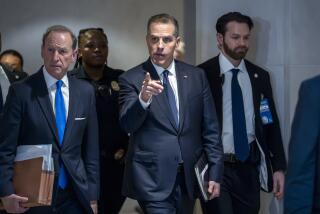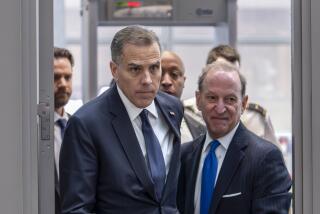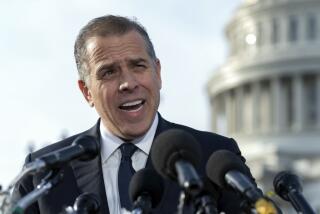Perot Charges Plot Forced Him Out; ‘Loony,’ GOP Says : Campaign: He accuses Bush camp of plan to smear daughter and disrupt her wedding, and says he quit race to protect her. Texan offers no proof for allegations.
Independent presidential candidate Ross Perot accused President Bush’s campaign Sunday of plotting to fake a photograph to smear his youngest daughter, of conspiring to disrupt her wedding and of hiring an ex-CIA employee to wiretap his computerized stock trading program and ruin him.
Perot said the plotting was the real reason he dropped out of the campaign for 11 weeks. He said he wanted to spare his daughter, Caroline, the pain that such dirty tricks could cause. After her wedding in August, Perot said, he told her what he had done. He said she replied: “Get back into the race.” He did, on Oct. 1.
“Preposterous,” said Marlin Fitzwater, the President’s spokesman, in response to Perot’s dirty-tricks allegations. Margaret Tutwiler, the White House communications director, declared: “It’s all loony.” Bobby R. Burchfield, general counsel for the Bush campaign, said he investigated Perot’s charges. “There is absolutely nothing to them.”
Perot made the accusations at campaign rallies in Pittsburgh and in Flemington, N. J., and in interviews with the Boston Herald and the CBS-TV program “60 Minutes.” He told voters in Pittsburgh that he had no proof of his allegations and asked them to put his accusations out of their minds. “Don’t spend five minutes fretting about it . . . because it’s irrelevant to fixing our country.”
His charges, however, reverberated throughout the campaign, drawing responses not only from the White House but also from Democratic nominee Bill Clinton, who recalled that the President once accused Perot of investigating Bush’s children. Clinton said he was concerned about the children of American voters and their future--and that both of his opponents should be, too.
Perot’s allegations could add to momentum that he is showing in the polls if voters believe his charges. His accusations also could backfire, however, and simply renew voter concern about what critics say is his conspiratorial view of the world. Perot’s standing in the polls fell when reports saying that he has a penchant for conspiracies were broadcast and published earlier this year.
Perot identified only one source for his information--a man named Scott Barnes, who he said called to pass along information about Americans missing in action in Vietnam. In the early 1980s, Barnes joined a team to hunt for POWs in Southeast Asia. Barnes claimed at the time that the team got involved in a plot to kill CIA agents being held in Laos. A Times investigation showed his claims were not true.
Perot said two additional sources gave him information about the dirty-trick plots. He declined to identify them. He called one “a friend” and the other a “person I respect.” The first tip, Perot said, “I just listened to. The second one raised my level of concern. The third one, I said: That’s a risk I can’t take.”
In his interview with the Herald, Perot said he got his first tip alleging dirty tricks from “a very prominent Republican from another part of the country.” He said the Republican told him about a meeting to discuss how hard it was to keep Perot’s early candidacy from climbing in the polls. Someone at the meeting, Perot said, mentioned: “This man adores his family.”
Perot said he learned soon afterward that Republican operatives had “started interviewing everybody who has known my children since childhood.”
At that point, Perot got his second tip. “60 Minutes” reported that Barnes telephoned Perot’s office and left a message about a doctored photo of Caroline Perot. “60 Minutes” said Barnes told its correspondents that he had seen the photograph.
Perot told the Herald: “They were going to smear her with a fake photograph that they had done with a computer, where you put a head on another body.” He said the Republicans intended to give the doctored photo to tabloid newspapers.
CBS reporter Leslie Stahl said an FBI official described Barnes “as a publicity hound who’s known for fabricating stories and plots.” Barnes could not be reached immediately for comment. In an interview shown on “60 Minutes,” Barnes said that he had gotten a telephone call last spring from a Bush campaign operative.
“He said he was calling at the request of Bob Teeter,” Barnes told the CBS program, referring to Bush’s campaign chairman. “He said he just wanted to ask a few questions concerning Ross Perot.” Stahl said Barnes claimed the Bush campaign was trying to recruit him to “go after” the independent candidate.
Burchfield, the campaign attorney, said Barnes did call the Bush-Quayle campaign and made suggestions, which Burchfield did not specify. “As soon as they found out that he was the crackpot that he so evidently is, they got him off the phone and did not follow up on any of his suggestions.”
At this point, Perot told the Herald, he received a third tip. “This was a very prominent, wired-in guy who’s part of the Republican party who contacted me and said: ‘Ross, they are going to try to embarrass you and your daughter at the church’. . . . They were actually going to have people at the church to disrupt her wedding.” That, Perot declared, “got my attention.”
“They were never specific,” he added, “but watch how they disrupt rallies; watch how they tried to disrupt the Democratic Convention. They got a bunch of neo-Nazis there that do this kind of stuff.”
Perot said he kept the information from his daughter. But he said he decided to drop out of the presidential race. When he announced his decision on July 16, he said publicly that he was doing it because the Democratic Party had been revitalized. In addition, he said, both parties were focusing on his biggest concern--the economy.
He also said at the time that he did not want to throw the election into the House of Representatives.
In truth, he told his campaign rally Sunday afternoon in Pittsburgh, “I could not allow my daughter’s happiest day of her life, or one of them, to be ruined because of me. . . . I stepped back to protect her.”
The day he pulled out of the race, Perot told the Herald, Bush telephoned him and suggested they meet. “I said, ‘Fine, I’ll meet with you,’ ” Perot told “60 Minutes.” “Then some people were arranging the meeting, and I sent a message in Technicolor that the first issue we would have to discuss were the pictures and my daughter and the plans to smear her and disrupt the wedding, because the wedding wasn’t until August.
“A few days later, they canceled the meeting. Maybe (there is) no correlation, but I find it interesting that they canceled the meeting.”
Burchfield, however, said: “The President suggested that he and Mr. Perot get together at some point, and they tentatively set up a meeting for Aug. 4. Subsequently, the President wrote Mr. Perot a letter, dated July 27, and said:
“ ‘Dear Ross: When we last talked, I know I mentioned Aug. 4 as a possible date for us to get together. However, I now find that due to a scheduling conflict, that will not work. Let’s do it later on or when it’s convenient for you. I’ll wait to hear from you.’
“And my understanding,” Burchfield said, “is that the ball was left in Mr. Perot’s court, and the meeting was never set up.”
Perot told his campaign rally in Pittsburgh that he had given the President and the Bush Administration several opportunities to deny the plots to embarrass his daughter. After her wedding, Perot said, he asked a senior adviser in the Administration to find out the truth. But Perot said he never got a response.
“I find it fascinating,” Perot told the Herald, “that neither George Bush or Jim Baker (the President’s chief of staff) would ever come back and say, ‘Perot, you’re crazy. We didn’t do this.’ ”
In response to Perot’s statements, Bush campaign aides told reporters that FBI agents had investigated his claims, found them baseless and told him so.
Tutwiler confirmed that Perot had spoken to Baker during one of two meetings they had after Perot dropped out of the race. But she said Perot spoke only in general terms about “Republican dirty tricks.”
“There was no evidence presented,” Tutwiler said. “It was a conclusive type of statement. Baker thought it was far-fetched.” When asked what she meant by a “conclusive type of statement,” she replied that Perot had simply stated his suspicions. “Mr. Perot did not ask Secretary Baker to do anything.”
In Pittsburgh, Perot said he understood that the Republicans had denied his allegations to reporters for “60 Minutes.” “I fully accept the indirect denial,” he said. But he added that he never got a denial “face to face.”
With the final wedding plans under way, Perot told the Herald, he learned of “a massive plan to wiretap” the code numbers used by his corporation to deal on international financial markets. He said he was told about the plot by someone involved.
“ ‘Why do they want to wiretap me?’ ” Perot said he asked the informant, whom he did not identify. “ ‘I’m out of the race.’
“And he said, ‘They’re mainly interested in your financial transactions. They figure the best thing is that unless they ruin you financially, you may do this again.’
“At that point,” Perot said, “I just handed it over to the FBI and walked away from it.”
He said the lead wiretapper was a man from Arizona who “has been a contract employee for the CIA.” Barnes has said in the past that he lives in Prescott, Ariz., and that he has done work for the CIA.
Perot said he also received a videotape “of the little guy from Arizona sitting on a park bench (in Dallas) talking to a very senior person in the Bush campaign for 20 minutes.
“You’d think they were fraternity brothers. I mean, they were patting one another on the knee; they were slapping one another on the back; they were shaking hands. And this was the day before the wiretap was to occur.”
The Herald said Perot declined to identify the campaign official or to say how he got the videotape. Perot said he turned it over to the FBI.
Correspondent Stahl on “60 Minutes” said Barnes had told its reporters that the Bush campaign had recruited him to do the wiretapping.
Perot said his tipster on the wiretap plot had sent him an accurate diagram of his office layout, complete with telephone numbers they wanted bugged.
In his “60 Minutes” interview, Perot described the alleged Republican plotting as “Watergate II.” He said the plotting was not done by low-level campaign operatives. “This was run at the top.”
Perot’s allegations led the FBI’s Dallas office to organize a “sting” in which an agent went undercover to try to interest Jim Oberwetter, Texas chairman of the Bush-Quayle campaign, in a tape recording that they purported to be a wiretap of Perot’s voice. Perot had made the recording to assist in the sting.
But Oberwetter said he did not bite. He told “60 Minutes” that his response was: “Haven’t you heard of Watergate?”
On “60 Minutes,” Buck Revell, chief of the FBI’s Dallas office, declared: “At this point, there is no evidence that we have found that would indicate that any of the presidential campaigns, at least here in Dallas, have directed any dirty tricks at any other campaign.”
The Dallas office could not be reached Sunday night to confirm the account.
Fitzwater, the White House spokesman, dismissed Perot’s charges as a fanciful effort to “embarrass the President in the final days of the campaign. “The stuff about his daughter is just crazy,” the presidential spokesman told reporters as Bush campaigned in the Rocky Mountain West. “It’s preposterous. . . . There haven’t been any dirty tricks against Ross Perot.
“It’s crazy, and he’s been told that, and he knows it. There’s nothing to it.”
Barnes has been involved in the POW issue since the early 1980s, when he joined a team formed by a former Green Beret lieutenant colonel named James G. (Bo) Gritz to search for missing Americans in Laos.
Barnes claimed at the time that he had gone from Thailand into Laos with a mysterious American who was not on the team and that they had photographed two white men in a prison camp. Barnes claimed the men were CIA agents and that the team subsequently was ordered to assassinate them. Gritz and all other team members denied his story.
The Times sent two reporters to Thailand to investigate Barnes’ claim. They checked hotel registers and telephone and telex records and found no gap in his stay in Thailand. Also, Laotians in the Thai village of Ban Don Phaeng, who Barnes claimed had accompanied him and the mysterious American into Laos, told The Times that Barnes had been at their village--but that he had never crossed the Mekong River into Laotian territory.
Times staff writer Douglas Jehl contributed to this story.
More to Read
Get the L.A. Times Politics newsletter
Deeply reported insights into legislation, politics and policy from Sacramento, Washington and beyond. In your inbox three times per week.
You may occasionally receive promotional content from the Los Angeles Times.







